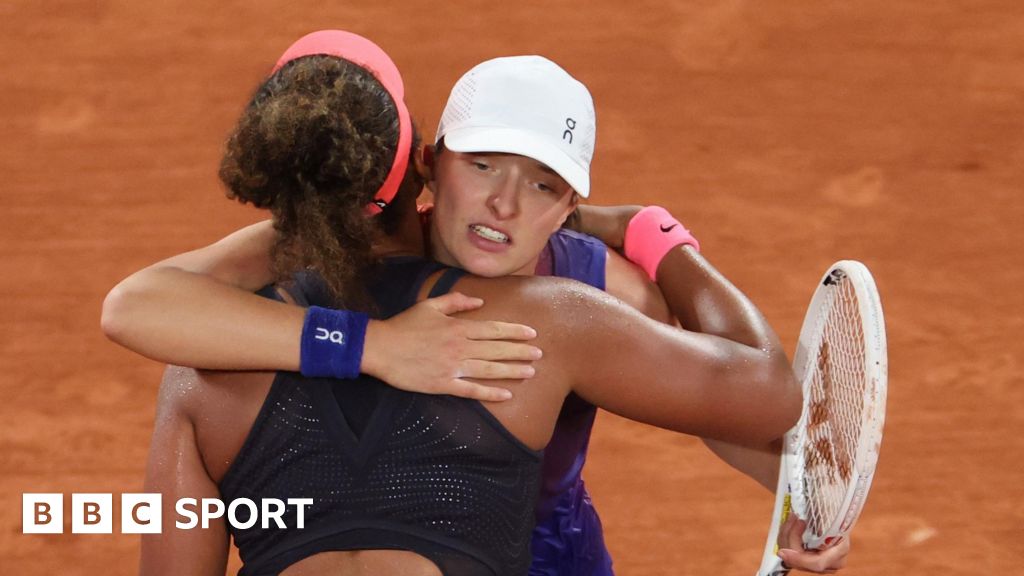Image source, Getty Images
- Author, Jonathan Jurejko
- Role, BBC Sport journalist at Roland Garros
If Iga Swiatek had been feeling the tension during her tough second-round match against Naomi Osaka, it hadn’t dissipated by the time it came to her on-court interview.
Moments after she came through to win a three-set thriller – having saved a match point in the decider – the 22-year-old Pole felt the need to rebuke the Roland Garros crowd for making noise during the points.
“Sometimes under a lot of pressure, when you scream something during the rally, it is very distracting and hard to focus,” world number one Swiatek told the French fans.
“This is serious for us and sometimes it is hard to accept. The stakes are big and we are playing for a lot of money.
“If you could support us before the rallies but not during. I love you guys and I always love playing here so let’s continue that.”
It was a startling reaction from a player who is known for her mild manners and who rarely attracts controversy in front of the microphone.
When she spoke to the media in her post-match interview little more than an hour later, the defending champion adopted a more conciliatory tone and joked she didn’t want to be put under the spotlight for the comments.
“I don’t know if that was a good decision or not,” she smiled.
“But I hope they can treat me as a human and just we can kind of work on it.”
But Swiatek’s comments brought the behaviour of Roland Garros fans under scrutiny once more.
On Tuesday, Belgium’s David Goffin claimed he had chewing gum spat at him by a French supporter when he played against home player Giovanni Mpetshi Perricard.
The atmosphere during Swiatek’s match was far from febrile, though.
The bigger issue seemed to be why there were so many empty seats on Court Philippe Chatrier for a high-quality and absorbing contest between two of the WTA Tour’s brightest stars.
Starting third in the day session on the main show-court, the match started at 17:37 local time [16:37 BST] and finished at 20:34.
You could only wonder where else the Parisian ticket-holders had headed.
“Osaka vs Swiatek is a brilliant watch. WTA need to do more to capitalise on these match ups!” Andy Murray, the British former world number one, said on X.
The swathes of seats were certainly not a good look.
Had the match been put on in the night session, Swiatek and Osaka would likely have been enjoyed by a much fuller crowd.
It led to more questions about the French Open’s scheduling policy, which has been criticised in recent years.
Instead of Swiatek versus Osaka, Wednesday night’s prime-time slot saw men’s second seed Jannik Sinner beat Frenchman Richard Gasquet in straight sets.
All four night sessions so far at the 2024 tournament have been men’s singles matches and a fifth – between home favourite Gael Monfils and Italy’s 30th seed Lorenzo Sonego – is scheduled on Thursday.
Only two women’s singles matches featured in a total of 20 night sessions across 2022 and 2023.
Three-time major finalist Ons Jabeur thought Swiatek versus Osaka should have had a night-session match, although Swiatek later diplomatically said she preferred playing in the day.
Jabeur called on the French Open to promote the women’s game more and hopes Mauresmo can oversee meaningful change.
“I’m going to get in trouble again, aren’t I? Listen, I know they’re trying here – I wish they’d try more,” said the Tunisian world number nine.
“It’s not something we’ll change in a day. I’m watching TV every day. A lot of men’s matches, more than women, and it is the truth.”

